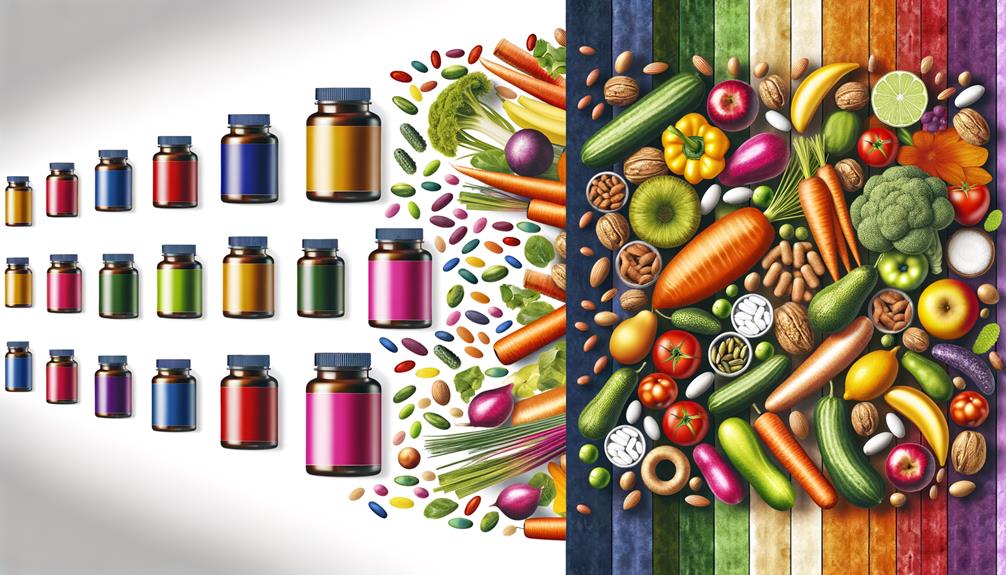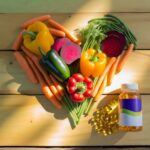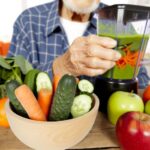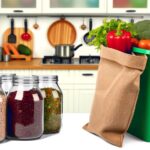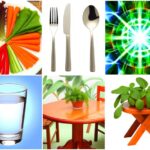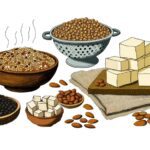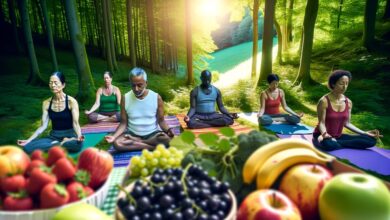While it's a common belief that a vegan diet might lack essential nutrients, you'll find that with the right knowledge, you can thrive on plant-based choices alone. You're conscious about what you put on your plate, prioritizing whole foods and natural ingredients, but it's crucial to recognize that even the most mindful eating plans may require supplementation. As you navigate through the abundance of plant-based options, you must consider the key vitamins and minerals that are less readily available in a vegan diet, such as vitamin B12, vitamin D, and omega-3 fatty acids, among others. It's not just about replacing meat with vegetables; it's about ensuring your body gets the full spectrum of nutrients to function optimally. So, let's explore which supplements are non-negotiable in a vegan lifestyle and why some fortified foods might not be enough to meet your nutritional needs. Stick with me as we uncover the building blocks of a truly balanced vegan diet that supports your health without compromising your values.
Key Takeaways
- Including a reliable source of vitamin B12 is essential in a vegan diet to prevent deficiency and maintain overall health.
- Vigilantly monitoring iron intake and consuming a variety of iron-rich foods can help prevent deficiency and related issues like anemia.
- Ensuring adequate vitamin D intake is important for bone health and immune system function on a vegan diet, as few foods naturally contain this vitamin.
- Omega-3 fatty acids are crucial for brain health and fighting inflammation, and can be obtained from plant-based sources like flaxseeds, chia seeds, and hemp seeds, or through algae-based supplements.
Vitamin B12 Necessities
As a vegan, it's essential to include a reliable source of vitamin B12 in your diet to avoid deficiency and maintain your overall health. Understanding vitamin B12 necessities is key to a thriving plant-based lifestyle. While vegan diets are rich in many nutrients, they naturally lack vitamin B12, an element vital for keeping your red blood cells and nervous system in check.
Vegans need to be mindful of their daily recommended intake, which is 2.4 mcg for adults. To meet this, you should regularly eat fortified foods or take supplements. Foods rich in vitamin B that are vegan-friendly include plant milks, breakfast cereals, and some types of nutritional yeast that are fortified with B12.
Neglecting your intake can lead to serious issues. A low vitamin B12 level can result in anemia, characterized by fatigue and weakness, or even long-term nervous system damage. To ensure you're serving your body well, embracing supplements vegans trust or consistently eating fortified foods will safeguard you against these risks.
Iron Intake Guidelines
To maintain optimal health on a vegan diet, you'll need to be vigilant about your iron intake, as this mineral is crucial for vital bodily functions such as DNA synthesis and energy production. Iron is found in several plant foods, but vegetarians and vegans may need to pay extra attention to ensure they're meeting their needs to avoid a deficiency that can result in issues like anemia.
Here are some iron intake guidelines to consider:
- Consume a variety of iron-rich foods: Legumes, tofu, and dark leafy greens are excellent sources. Foods rich in vitamin C, like citrus fruits, can enhance iron absorption.
- Understand the recommended daily allowance (RDA): For adult vegetarians and vegans, the RDA may be 1.8 times higher than for those who eat meat.
- Monitor for signs of deficiency: Fatigue and a weakened immune system can signal that you're not getting enough iron, which is essential to carry oxygen throughout the body.
- Supplements: If you struggle to get enough iron from diet alone, supplements do vegans a great service to prevent deficiency.
Importance of Vitamin D
Understanding the role of vitamin D is crucial for vegans, as it not only supports bone health but also bolsters your immune system and aids in muscle recovery. This essential nutrient enhances calcium absorption, vital for maintaining strong bones, and plays a significant role in immune function, mood, memory, and muscle recovery.
As a vegan, you're likely aware that very few foods naturally contain vitamin D, which brings to light the potential risk of deficiency. The recommended daily intake of vitamin D is 600 IU for children and adults, yet achieving this solely through a plant-based diet can be challenging.
You can optimize your blood levels of vitamin D by seeking sun exposure, which stimulates its production in your skin. However, depending on where you live, the season, and your lifestyle, getting sufficient sunlight may not always be feasible. That's where supplements come into play, serving as a reliable source to ensure you meet your daily needs.
It's important to consider fortified foods that contain vitamin D, such as plant milks and cereals, as part of your intake strategy. Regular monitoring of your vitamin D levels can guide you in adjusting your intake of supplements and fortified foods to maintain health and vitality within your compassionate lifestyle.
Omega-3 Fatty Acids Sources
Omega-3 fatty acids, crucial for brain health and combating inflammation, are accessible to vegans through plant-based sources like flaxseeds, chia seeds, and hemp seeds. These essential fats, including alpha-linolenic acid (ALA), can support your well-being without relying on animal products. However, it's important to note that your body needs to convert ALA into eicosapentaenoic acid (EPA) and docosahexaenoic acid (DHA) to reap the full benefits, and this conversion process can be inefficient.
To ensure you're getting enough of these vital nutrients for optimal brain development and to reduce inflammation, consider incorporating the following vegan foods into your diet:
- Ground flaxseeds: Sprinkle them on your oatmeal or blend into smoothies.
- Chia seeds: Create a chia pudding or stir them into plant-based yogurts.
- Walnuts: Snack on them or add to salads for a crunchy texture.
- Algae-based supplements: An excellent direct source of DHA and EPA for those on a plant-based diet.
Calcium and Vegan Diets
As a vegan, getting enough calcium is crucial for maintaining strong bones and proper muscle function, and you can find this vital mineral in plant foods like kale and broccoli, as well as in fortified plant milks and juices. Ensuring you meet the daily recommended amount supports your bone health and contributes to the health benefits of a plant-based diet.
Calcium is one of the essential nutrients that sometimes calls for extra attention in vegan diets. While foods such as leafy greens are excellent sources, the bioavailability of calcium from these foods can vary. Therefore, incorporating fortified foods, like plant milks enriched with calcium, ensures you're getting a reliable dose of this important mineral.
Frequently Asked Questions
What Food Supplements Do Vegans Need?
You'll need plant proteins, iron intake boosters, algae omega-3, and calcium sources. Don't forget zinc supplements, iodine's importance, vitamin C for absorption, selenium support, essential amino acids, and digestive enzymes for overall health.
What Do You Need for a Healthy Vegan Diet?
You'll absolutely thrive on a vegan diet that's bursting with plant-based proteins, leafy greens, and whole grains. Don't forget nutritional yeast, almond milk, and legume varieties for that extra health kick!
Which Supplement Is Often Among Those Required by Vegans?
You'll need Vitamin B12 for its importance in iron absorption and nerve health. Consider Omega-3, calcium, zinc, iodine, and DHA sources, plus protein strategies, selenium supplementation, and tackling potential vitamin D deficiencies.
Which of the Following Supplements Would You Most Recommend a Vegan?
Like navigating a complex maze, choosing the right supplement requires knowledge. For you, plant-based omega-3 from algal oil sources is key, alongside zinc-rich foods and iron absorption tips to maintain optimal health and vitality.
